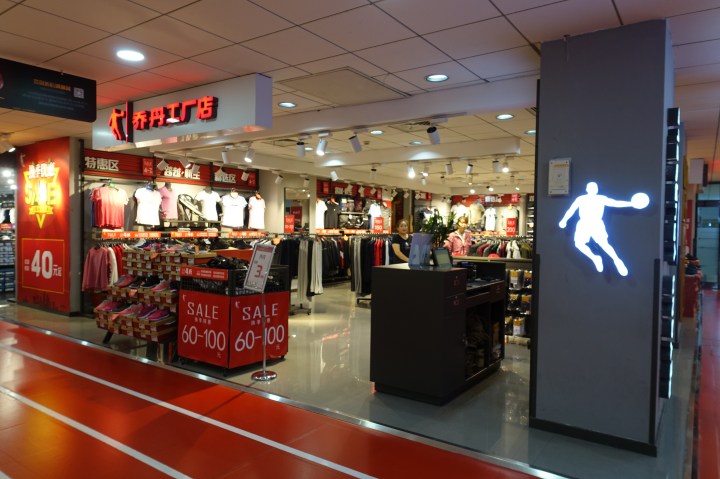
Some companies find their brand names already claimed in China
Some companies find their brand names already claimed in China

For American firms that design shoes, handbags or electronics, there is a high chance their trademarks have already been registered in China by someone else.
“These [trademark filers] almost certainly are not using the mark. They’re sitting around, waiting to be bought out,” said intellectual property specialist Joe Simone.
The practice is called bad faith trademark registration, or “trademark squatting.” It’s a problem American firms encounter in China, and one that is even more common than intellectual property theft or the forced technology transfers that are both being discussed in the U.S.-China trade talks, which resumed in Beijing this week.
Trademark squatting occurs because unlike in the U.S., where trademark rights are granted to applicants on a first-to-use basis, China recognizes those who file for the mark first.

Intellectual property specialist Joe Simone says trademark squatting is a very common problem his clients encounter when doing business in China.
This first-to-file system has created a whole industry of what Simone refers to as trademark “pirates.”
“We had a very small bakery in New York [that] probably was talking in the press about expanding in Asia and then somebody filed for the mark in China,” Simone said. The trademark squatting problem is particularly acute in the fashion industry, since most brands are small and medium-sized businesses who consider the China market at a much later stage in their growth.
Last year, a survey conducted by Simone’s firm found that half of the 500 brands surveyed had been pirated an average of four times each and for all kinds of goods, Simone said. In a demonstration for Marketplace, he searched for the trendiest fashion labels and selected the first one, a U.K. brand. He entered the brand name into China’s public database of trademarks and found that two Chinese companies and an individual had filed for the mark under various categories of goods. The U.K. brand had not applied for a trademark in China.
If the British label tries to sell its own clothes, bags or eyewear in the Chinese market, it can be sued for infringing on trademark holders – who all appear to be Chinese nationals. The U.K. label did not respond to interview requests from Marketplace.
Even if an American brand does not plan to sell in China, the firm should still guard its trademark.
“We were contacted by four European companies that controlled, maybe, around 80 percent of a particular product market,” said lawyer Dan Harris, who advises companies that do business in China. The firms all produced in China but didn’t file for Chinese trademarks. One of their Chinese manufacturers went out and registered all four European brands.
“Once [the Chinese manufacturer] got their China trademark, they told these four companies: you cannot ship product from China anymore. It was a disaster for these four companies,” Harris said.
A company that does not own its trademark in China will also have difficulty stopping counterfeiters.
Brand owners can seek legal recourse against trademark squatting. In 2012, Apple paid $60 million to a Chinese company that had registered the iPad name after a court in southern China rejected Apple’s right to the trademark.
But experts say that, in recent years, foreign firms are finding more success fighting intellectual property rights cases in Chinese courts. Basketball star Michael Jordan has had a drawn-out trademark battle against Chinese firm Qiaodan Sports. In 2016, China’s supreme court ruled that Jordan has the right to the Chinese rendering of his name, Qiaodan.
However, it took Jordan four years to win, and Qiaodan Sports shops appear to be able to continue to use the Chinese name. The court ruling also does not prevent Qiaodan Sports, a multi-million-dollar operation, from using a very similar logo to Jordan’s Nike brand.
A legal fight can cost a company between $40,000 and $80,000, according to Simone.
Basketball star Michael Jordan has argued that China’s Qiaodan Sports logo (right) resembles his official logo with Nike (left) but he has continued to lose those trademark cases.
That doesn’t include the lengthy investigation costs to build a case. In the meantime, the American brand is unable to sell in the Chinese market.
“Which is why sometimes companies say, ‘I’ll pay $50,000 [or] $100,000,’ sometimes up to half a million, when you’ve settled with these sort of pirates,” Simone said.
Trademark squatting is not unique to China, but the scale of the problem is tough to handle for the smaller American brands who are usually the target.
“We still see these filings pop up and have to continue to bring new actions against different entities trying to cleverly register a mark that’s very similar,” said Diane Reed at the intellectual property law firm, Knobbe Martens.
However, a few days before the latest round of U.S.-China trade talks at the end of April, the Chinese government unexpectedly revised its trademark law.
“China decided to impose fines on trademark pirates,” Simone said. “Now on top of that, the trademark agent or lawyer who assisted the applicant, the pirate, may also be fined.”
Simone said this will give his team more tools to deter trademark squatters.
However, the best defense for American firms is to register trademarks in China the moment the brand is created.
May 21, 2019: The text in this story has been updated.
There’s a lot happening in the world. Through it all, Marketplace is here for you.
You rely on Marketplace to break down the world’s events and tell you how it affects you in a fact-based, approachable way. We rely on your financial support to keep making that possible.
Your donation today powers the independent journalism that you rely on. For just $5/month, you can help sustain Marketplace so we can keep reporting on the things that matter to you.












